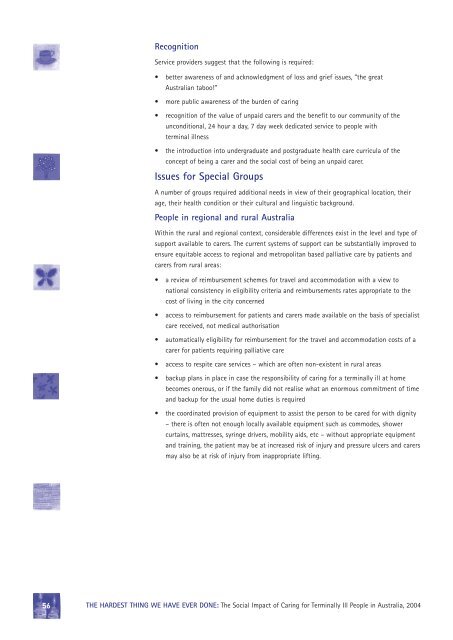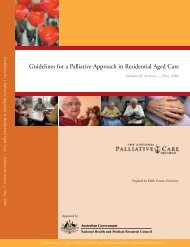The hardest thing we have ever done - Palliative Care Australia
The hardest thing we have ever done - Palliative Care Australia
The hardest thing we have ever done - Palliative Care Australia
You also want an ePaper? Increase the reach of your titles
YUMPU automatically turns print PDFs into web optimized ePapers that Google loves.
Recognition<br />
Service providers suggest that the following is required:<br />
• better awareness of and acknowledgment of loss and grief issues, “the great<br />
<strong>Australia</strong>n taboo!”<br />
• more public awareness of the burden of caring<br />
• recognition of the value of unpaid carers and the benefit to our community of the<br />
unconditional, 24 hour a day, 7 day <strong>we</strong>ek dedicated service to people with<br />
terminal illness<br />
• the introduction into undergraduate and postgraduate health care curricula of the<br />
concept of being a carer and the social cost of being an unpaid carer.<br />
Issues for Special Groups<br />
A number of groups required additional needs in view of their geographical location, their<br />
age, their health condition or their cultural and linguistic background.<br />
People in regional and rural <strong>Australia</strong><br />
Within the rural and regional context, considerable differences exist in the level and type of<br />
support available to carers. <strong>The</strong> current systems of support can be substantially improved to<br />
ensure equitable access to regional and metropolitan based palliative care by patients and<br />
carers from rural areas:<br />
• a review of reimbursement schemes for travel and accommodation with a view to<br />
national consistency in eligibility criteria and reimbursements rates appropriate to the<br />
cost of living in the city concerned<br />
• access to reimbursement for patients and carers made available on the basis of specialist<br />
care received, not medical authorisation<br />
• automatically eligibility for reimbursement for the travel and accommodation costs of a<br />
carer for patients requiring palliative care<br />
• access to respite care services – which are often non-existent in rural areas<br />
• backup plans in place in case the responsibility of caring for a terminally ill at home<br />
becomes onerous, or if the family did not realise what an enormous commitment of time<br />
and backup for the usual home duties is required<br />
• the coordinated provision of equipment to assist the person to be cared for with dignity<br />
– there is often not enough locally available equipment such as commodes, sho<strong>we</strong>r<br />
curtains, mattresses, syringe drivers, mobility aids, etc – without appropriate equipment<br />
and training, the patient may be at increased risk of injury and pressure ulcers and carers<br />
may also be at risk of injury from inappropriate lifting.<br />
56 THE HARDEST THING WE HAVE EVER DONE: <strong>The</strong> Social Impact of Caring for Terminally Ill People in <strong>Australia</strong>, 2004
















